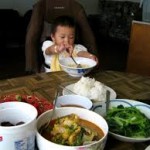 A recent conversation with a food blogger here in West Stockbridge led me to this blog today. We were discussing his latest book set to be published “The Little Cookbook of Philosophy.” The book by Keith Emerling is a compilation of his various relationships to food. Using various artistic genres he illustrate his passion and connection to food and its production.
A recent conversation with a food blogger here in West Stockbridge led me to this blog today. We were discussing his latest book set to be published “The Little Cookbook of Philosophy.” The book by Keith Emerling is a compilation of his various relationships to food. Using various artistic genres he illustrate his passion and connection to food and its production.
Woven together through poems, short essays and a number of recipes accompanied by colorful pictures he gives readers a taste for food and a philosophy about the food industry. You can see some photos and learn more about this artist here. Many of his commentaries speak to the nature by which the industry has grown into a mass production system in need of more regulation and the acts by which we can take as consumer to become advocates for change.
What we chose to discuss in more detail was the concept of the connection between food and culture. In one regard we spoke of the elitism and foods that have been deemed healthy that often include and exclude certain cultures (a future blog entre).
The other aspect of culture we spoke of was the importance of how cultural traditions influence our food choices and meals. The culture from which we come from, arrive at through our palates shapes how we eat. Many of our first connections to our culture are made by way of the kitchen. We are fed from the time we are infants via our parents who typically give us what they were given as children themselves in combination about what they have been educated about along the way to becoming adults.
Through this we develop our first tastes, likes and dislikes for foods that become familiar to us. We begin to create a dialogue with ourselves about food and this becomes a pathway to several other culinary experiences. These pathways are maintained throughout our lifetime as we add to them with our own culinary adventures.
What this led me to reflect on is my own experience when I found myself disconnected to this pathway. At one point in my healing journey my relationship with eating became extremely strained. Eating challenged me as my body feeling this strain rejected foods. Consuming foods pureed and blended was working but the foods themselves were unpalatable.
This shifted how I thought about food and the act of eating. I asked myself, “What do I enjoy about food?” “What makes me want to eat?” …and then there it was, the answer was simple-IT’S THE TASTE! I remember the day I went to the garden, picked some oregano and gave it to the chef at a health center I was attending and asked for my next meal to be cooked with this. And you know what I ATE…AND ATE AND ATE AND IT ALL STAYED IN. I cried I was so overjoyed.
Eating is not just a mechanical process by which we keep our body and spirit in motion but an act of deliberate commune with our bodies. This dialogue is supported when we encourage ourselves to take the approach to choosing what and how we eat with an understanding for who we are and this includes our cultural backgrounds.
We need to be aware as much about what is good for our bodies, healthy and appropriate for us as we are about what gives us pleasure and a sense of satisfaction. This pleasure and satisfaction is often defined by what we have enjoyed in the commune nature of eating with those we love.
So, when you take it upon yourself to come up with a meal tonight for one or a family gatherings of friends and relatives consider what elements go into your food to make it yours. Take in the flavors, fragrances particular sensations or any other elements of your cooking that speak to your culture.
Perhaps a dab of this or dash of that is all you need to make the meal you serve not just food on a plate but a communication of your spirit.
Let your culture inspire your creations and have fun.
In health,
Safara








